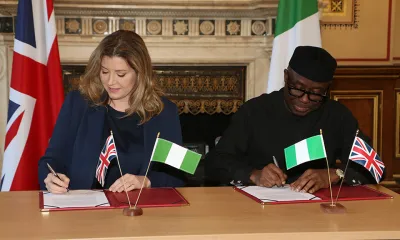There are no products in your shopping cart.
| 0 Items | £0.00 |


NIGERIAN exports are set to benefit from a new trading scheme in the United Kingdom that will cut price tariffs on hundreds of everyday products imported into the country from the beginning of next year.
Under the terms of the new policy, a wide variety of products from clothes, shoes and food items including olive oil and tomatoes imported from Africa to the UK will benefit from lower or zero tariffs. Anne-Marie Trevelyan the UK's international trade secretary who unveiled the policy at the official launch of the Developing Countries Trading Scheme (DCTS) in Abuja, noted that it would reduce the cost of living and help support the economies of developing countries in the face of a global recession.
In 2018, former British prime minister Theresa May, had hinted about a new trade deal and economic partnership during her visit to Nigeria. This trading scheme will assist British businesses earn £750m per year from reduced import costs, leading to more choice and lower costs for the UK consumers to help with the cost of living crisis.
Ms Trevelyan said: “As an independent trading nation, we are taking back control of our trade policy and making decisions that back the UK businesses, help with the cost of living, and support the economies of developing countries around the world. UK businesses can look forward to less red tape and lower costs, incentivising firms to import goods from developing countries.”
Gill Atkinson, the acting British high commissioner to Nigeria, added: “Nigeria will automatically benefit from enhanced preferences under the DCTS. This means 99% of total goods exported from Nigeria are eligible for duty-free access to the UK, saving £500,000 on tariffs.
"As an example, cocoa butter exporters will save £180,000. It’s great to see that the new DCTS will also simplify seasonal tariffs, meaning additional access for Nigeria’s exports to the UK.”
DCTS covers 65 countries across Africa, Asia, Oceania and the Americas including some of the undeveloped countries in the world and is part of a wider push by the UK to drive free trade, pro-growth agenda across the globe. Following her decision to leave the European Union, the UK has had to search for new markets as she no longer benefits from being part of a common market.